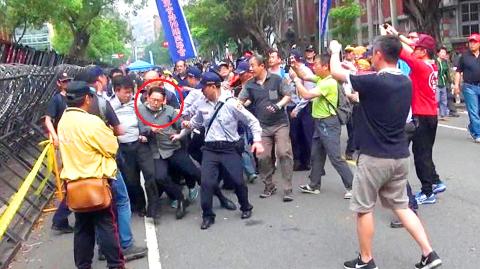Premier Lin Chuan (林全) yesterday condemned violence against local government heads and lawmakers allegedly committed by opponents of pension reform proposals, calling on the National Police Agency to expedite an investigation into the incidents.
Lin made the comments during a Cabinet meeting amid complaints from Democratic Progressive Party (DPP) lawmakers that police officers did not properly enforce the law when hundreds of demonstrators protesting pension reforms resorted to violence against them outside the legislature in Taipei on Wednesday in an attempt to disrupt a planned legislative review of the government’s proposals.
The use of violence by protesters disrupted the functioning of the nation’s democratic institutions, Lin said, pledging to work toward creating clearer and more effective guidelines for law enforcement officials.

Photo: copied by Wang Kuan-jen, Taipei Times
Continued delays of the government’s pension reforms would lead to substantial setbacks for societal and national development, he said.
Lin said the pension reforms aim to create a sustainable civil servants’ pension fund and redistribute the financial burden of future generations more fairly.
It is inevitable that an issue so close to the personal interests of many people would lead to protests and, in a democratic society, certain liberties are granted for people to express themselves, but they “must not transgress relevant national systems or the bounds of law enforcement,” Lin said.
Cabinet spokesman Hsu Kuo-yung (徐國勇) said the Executive Yuan is to take responsibility for investigating the alleged violent incidents, including those against Taipei Mayor Ko Wen-je (柯文哲) and Taoyuan Mayor Cheng Wen-tsan (鄭文燦).
“The Executive Yuan expresses its profound sadness at the events that transpired yesterday and unequivocally condemns the acts of violence. We hope protesters will express their demands rationally, and stop hindering lawmakers and officials from conducting official business in the legislature,” Hsu said.
Meanwhile, police have so far confirmed 15 separate alleged incidents of protesters breaking the law and 26 alleged perpetrators from video footage of the protests, the Taipei Police Department said.
A total of 13 individuals had been identified as of press time last night and they were to be questioned, the department said, adding that Democratic Progressive Party (DPP) Legislator Wang Ding-yu (王定宇) pressed charges earlier yesterday and SET-TV (三立電視) said it would also press charges for damage to one of its outside broadcast vans.
Among the list of identified suspects were Taipei Metro Union executive member Wang Yu-wen (王裕文), who was alleged to have struck DPP Legislator Lin Chun-hsien (林俊憲) with his elbow.
Peng Ke-ying (彭克英), a member of the Pension Reform Oversight Alliance, allegedly attacked Cheng, Wang Ding-yu, New Power Party Legislator Hsu Yung-ming (徐永明) and Minister of Civil Service Chou Hung-hsien (周弘憲).
One military veteran was arrested on Wednesday for smashing the windshield of the SET-TV van with a hammer, police said.

The US government has signed defense cooperation agreements with Japan and the Philippines to boost the deterrence capabilities of countries in the first island chain, a report by the National Security Bureau (NSB) showed. The main countries on the first island chain include the two nations and Taiwan. The bureau is to present the report at a meeting of the legislature’s Foreign Affairs and National Defense Committee tomorrow. The US military has deployed Typhon missile systems to Japan’s Yamaguchi Prefecture and Zambales province in the Philippines during their joint military exercises. It has also installed NMESIS anti-ship systems in Japan’s Okinawa

TRAGEDY STRIKES TAIPEI: The suspect died after falling off a building after he threw smoke grenades into Taipei Main Station and went on a killing spree in Zhongshan A 27-year-old suspect allegedly threw smoke grenades in Taipei Main Station and then proceeded to Zhongshan MRT Station in a random killing spree that resulted in the death of the suspect and two other civilians, and seven injured, including one in critical condition, as of press time last night. The suspect, identified as a man surnamed Chang Wen (張文), allegedly began the attack at Taipei Main Station, the Taipei Fire Department said, adding that it received a report at 5:24pm that smoke grenades had been thrown in the station. One man in his 50s was rushed to hospital after a cardiac arrest

‘WIN-WIN’: The Philippines, and central and eastern European countries are important potential drone cooperation partners, Minister of Foreign Affairs Lin Chia-lung said Minister of Foreign Affairs Lin Chia-lung (林佳龍) in an interview published yesterday confirmed that there are joint ventures between Taiwan and Poland in the drone industry. Lin made the remark in an exclusive interview with the Chinese-language Liberty Times (the Taipei Times’ sister paper). The government-backed Taiwan Excellence Drone International Business Opportunities Alliance and the Polish Chamber of Unmanned Systems on Wednesday last week signed a memorandum of understanding in Poland to develop a “non-China” supply chain for drones and work together on key technologies. Asked if Taiwan prioritized Poland among central and eastern European countries in drone collaboration, Lin

ON ALERT: Taiwan’s partners would issue warnings if China attempted to use Interpol to target Taiwanese, and the global body has mechanisms to prevent it, an official said China has stationed two to four people specializing in Taiwan affairs at its embassies in several democratic countries to monitor and harass Taiwanese, actions that the host nations would not tolerate, National Security Bureau (NSB) Director-General Tsai Ming-yen (蔡明彥) said yesterday. Tsai made the comments at a meeting of the legislature’s Foreign Affairs and National Defense Committee, which asked him and Minister of National Defense Wellington Koo (顧立雄) to report on potential conflicts in the Taiwan Strait and military preparedness. Democratic Progressive Party (DPP) Legislator Michelle Lin (林楚茵) expressed concern that Beijing has posted personnel from China’s Taiwan Affairs Office to its